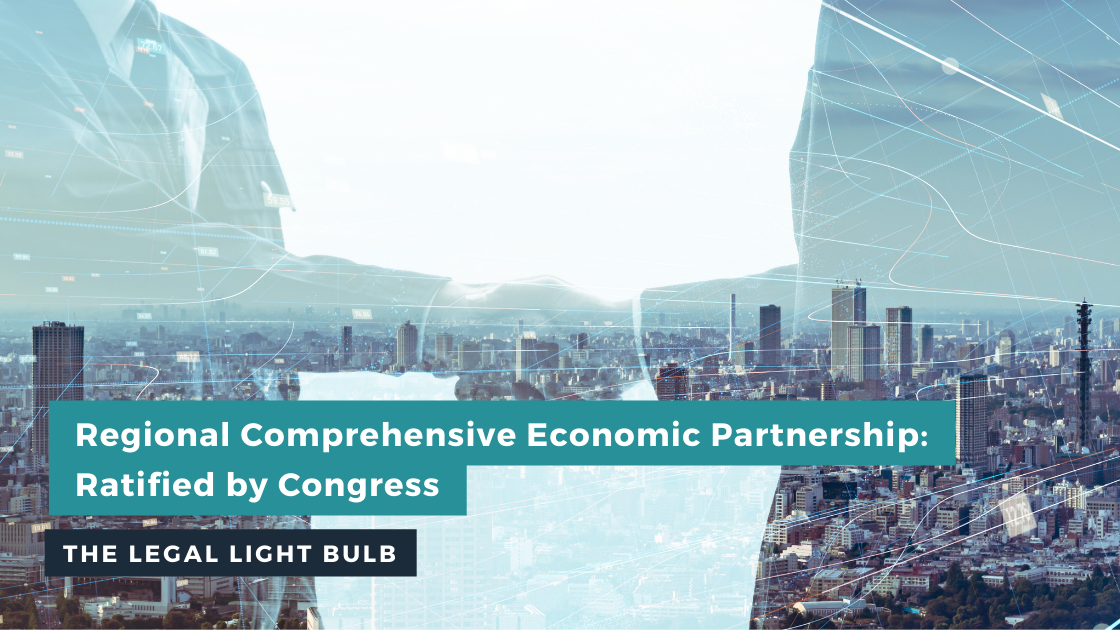Joining an economic partnership goliath
The Regional Comprehensive Economic Partnership is currently the world’s largest trade and investment agreement. As an economic bloc that includes the ten ASEAN countries, as well as five of its major trading partners – Australia, China, Japan, South Korea, and New Zealand, it accounts for almost a third of the world’s gross domestic product (GDP) and a combined market that covers a third of the world’s population.
Change of heart to seize greater opportunities
Regional Comprehensive Economic Partnership was entered into force on 01 January 2022 after meeting the required number of member states to ratify the landmark trade deal. Before the recent nod of approval by the Senate, the Philippines, out of the 15 signatory states, was the last to complete its ratification process. President Ferdinand “Bong Bong” Marcos Jr. expressed reservations about the agreement but had a change of heart after the inflation which has surged to a 14-year high.
“With the country’s participation [in] Regional Comprehensive Economic Partnership, the Philippines has now further strengthened its position as an ideal investment hub in the region as we expand market access, facilitate trade, and align our rules and procedures with participating economies,”[1] National Economic and Development Authority (NEDA) Secretary Arsenio Balisacan said.
The Department of Trade and Industry (DTI) likewise highlighted the critical role of the Regional Comprehensive Economic Partnership in boosting equitable economic growth, especially for micro, small, and medium-sized enterprises, through the expansion of regional trade, services, and investment linkages.
The agency also presented the 4Cs in which the key benefits of Regional Comprehensive Economic Partnership for the Philippines can be summarized, namely: a) cheaper costs for sourcing key inputs of the manufacturing sector; b) convenience for businesses in trading with key FTA partners; c) competitiveness for Philippine industries; and d) complementation of existing government support programs. The Management Association of the Philippines also commended the ratification of the Regional Comprehensive Economic Partnership. According to them, “the ratification will enable the Philippines to compete on equal footing with our ASEAN and Asian partners already in the Regional Comprehensive Economic Partnership in attracting foreign investments, as they capitalize on the shift by several multinational corporations to seek alternative locations for their manufacturing sites.”
More trade deals
The move comes as the Philippines further eased restrictions on foreign businesses through the introduction of amendments to the foreign investment act of 1991. This amendment is consistent with the policy of the new Marcos administration to attract, promote and welcome productive investments from foreign individuals, partnerships, corporations, and governments, including their political subdivisions, in activities that significantly contribute to sustainable, inclusive, resilient, and innovative economic growth, productivity, global competitiveness, employment creation, technological advancement, and countrywide development. For foreigners who wish to learn more about these new policies, it is best to schedule an online lawyer consultation with top law firms in the Philippines.
Together with the said economic policies and objectives, the potential benefits of the Regional Comprehensive Economic Partnership include improved market access for goods and services, reduced trade barriers, and wider trade deficits from increased importations.[2]
With these benefits in sight, investors that are eyeing the country as a production hub can now set up manufacturing centers in the Philippines and provide investments here. Local manufacturers can also benefit from the Regional Comprehensive Economic Partnership as they will be able to secure their raw materials and intermediate goods for production from other participating countries at a more favorable tariff rate.
With the new opportunities delivered by continued progress and amendments in the local and international investment laws in the Country, it is advantageous to consult a business registration lawyer and be guided by the best corporate law firm in the Philippines to fully explore the possibilities that await.
Written by: Jan Gabriel Sebrio
[1] RCEP may take effect as early as May – BusinessWorld Online (bworldonline.com)





